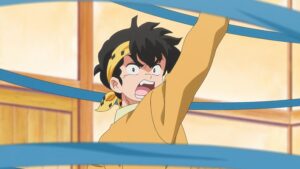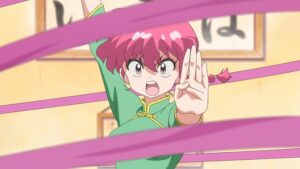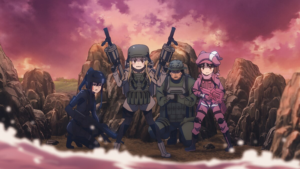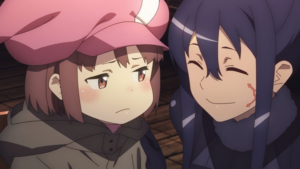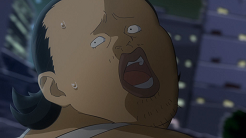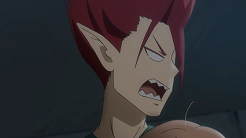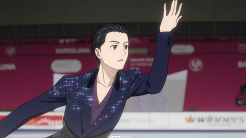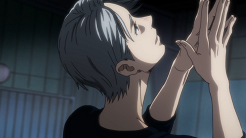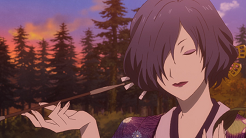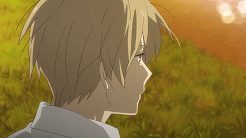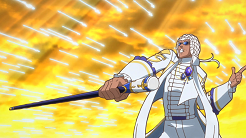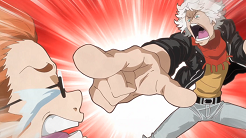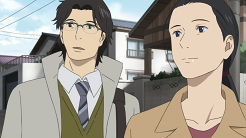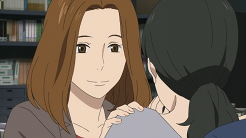Delayed by a day, because I wanted to include Classicaloid’s ending in this. Word currently says that this turned into an article of more than 4500 words, Jesus Christ what am I doing. At the very least I’ve got the passion to write back, but at the same time this format works best: write a huge amount once a month (or twice in the start of a season) and take a bit of a break the rest of the time. This works when balancing this blog with the rest of my life. There will be some weird months here and there, but eh, we’ll see when they come.
As usual: yarr there be spoilers. Really major ones this time because this month delivered some really good plot twists and endings, but I also really want to talk about them and all of their contexts. Again these are just my impressions of whatever aired the past month, the episode numbers are indicated next to the title, and these are ranked based upon the shows I liked least to best this month.
#10: Piace – Watashi no Italian (08-12)


This month, something happened to Piace: it stopped being funny. This is a pretty big deal for a comedy.
It’s classic what happened: as the show goes on the best jokes run out, and the creators hope that they can continue on, on the merits of the characters. The problem is that you need to have good characters for that, and it became painfully obvious that Piace only had its comedy to write home about. Without it, these characters are empty shells. Stereotypes and cardboard boxes who just depend on their own two quirks, rather than being actual characters.
Yeah, it’s pretty serious for a show of 12 episodes of only 20 minutes to run out of material. Like dude, it’s not that hard! It’s Italian food! I mean I finished this up because of how short it was, but this last month unfortunately was another strike against series like this: their creators are a bunch of lazy bastards. This was one of the few that actually had some effort going into it, which makes it all the more sad that they couldn’t even remain fired up for a measly 36 minutes.
I am a completionist, but next season I will stop giving every tiny show the same kind of attention. Only if they’re notable in some way, because this trend is getting too much out of control.
#9: Onihei (08-12)


So of course Onihei has to be the oddball here to have its final episode air on april 4th, while the new season is already well under its way. Ah screw it, unless the final episode does something really unusual this is going to be my final say on the series, I don’t want to wait that long.
Onihei always stood apart from the other series this season. It attempted to show samurai tales from a different perspective, and it didn’t shy away from the ugliness, while not going completely overboard like what Shigurui did. Every episode showed a different story, which tried to be thought-provoking in some way or another. Last month I complained about there way too many pure evil minor-characters who only existed for the story’s sake and had no depth to them whatsoever, and this month improved that. They were still there, but not as abundantly as before. The stories all were interesting, I saw no real big slips or overly stupid episodes.
However my problem with this series is that thinking back… I kindof have to say that I liked the first episode best here. And that’s not a good sign. The fist episode to me was the sharpest. Had the best ideas. And while the other ones aren’t bad by any means, you just keep hoping for something as good as the first impression, and that tends to sting more and more as the show goes on. Thankfully episode 12 came close to it, at the very least I consider it the best of the rest, but even then I can’t get rid of this slightly bad aftertaste for Onihei.
Also, I’d like to say a few things about the acting in this series: the show has this look that’s different from the other series this season, and the creators tried to put in a lot of details in the characters’ faces. But the problem is that it’s also really had to emote that, and what irked me through the entire series was that all facial expressions just look weird. The budget was very obviously limited, but the creators here need to learn the art of cutting corners. They did the basics of course, but strangely not in the area of facial expressions. I mean I can forgive bad animation of course, but the whole reason why I watch anime is watching characters being brought to life. And watching these weird expressions in this uncanny valley… it didn’t work as well as the creators hoped to.
#8: Hand Shakers (09-12)


Okay, that ending. First of all it was obvious sequel-bait, but even then this episode definitely also attempted to close things off in case the investors aren’t gonna bite, and with that in mind you’d expect some sort of closure. That happened, but as the final two episodes went on I found myself really scratching my head because the main villain really wasn’t making any sense.
We’re talking about a former partner, who broke off without saying anything, who went on to kidnap a young girl and drug her into fighting for him and keeping her from disappearing. I know the alternative was putting her to sleep, but even then this seems wrong on so many levels, especially seeing it develop into this weird Stockholm syndrome relationship. And when they revealed his reasoning behind everything things made even less sense. Holy crap what an anti-social dork!
Only when I really started to read inbetween the lines did I see the values of this ending. Handshakers isn’t just about a bunch of people fighting, it’s about deeply flawed people, connecting with each other through something as innocent as holding a hand. Even the two leads: one born doomed to be different, the other haunted by the death of his sister. And a big theme throughout this series is characters trying to pretend that nothing is wrong and things are perfectly normal. People being afraid to show their true colours, and being beaten allows them to fully open up and accept themselves. Within that context, this all makes sense, and it fits within the central theme of hand holding. But yeah, this really is one of those series where reading inbetween the lines is absolutely necessary, otherwise this was a horrible ending.
So yeah, I was preparing to write this whole rant about wasted potential, but in the end I just can’t. I appreciate this series, I really do. And I do not regret watching it. If anything, it tried a whole different way of storytelling, and just for that it deserves credit. Hand Shakers is nice. If has warmth. It’s cliched on the surface, but beyond it’s worth it. However the cliches on the surface remain. If there ever comes a second season, I’d love to see less typical stories. Don’t start with idols, thugs and incest, start with actual characters. Dare to stay away from the stereotypes.
#7: Kuzu no Honkai (08-12)


Again that final minute! What Kuzu no Honkai did in its final month was different: instead of focusing on unrequited love, it had two other focuses: moving on, and actual love. Moving on was the logical progression: everybody got their time to show their feelings come to a breaking point, and being able to move on from their desires, accepting that it never was gonna be something. The actual romance though… sorry but I just didn’t buy it. It was just way too cheesy for me to take seriously. This show was always good at the dark side of romance. The bright side: nope. Especially not so quickly after Fune wo Amu.
So yeah, the entire final episode was hinting at that the two leads were gonna end up as a couple after not seeing each other fr a while. The hints were so obvious and cliched, you see them everywhere. And then… they don’t! They actually realized that they could return, yet they chose because they wanted real romance and went their own way! The only correct way for this show to have ended. Move on! There are more fish in the ocean! Any relationship between these two would have been doomed from the start.
I do think that this is the month I enjoyed the least of this series. It mostly had to do with how good it was at its unrequited love. This ending wrapped everything up perfectly fine and it left the cast as very well rounded, so it was definitely necessary, but it didn’t have that “wow”-factor that the first parts had. Although I still want to praise it a lot for that ending. And also one other thing: it’s Noitamina. Ideally, I would like to never again see a series to take place in a high school in this timeslot again. The timeslot was meant for adult series, and we have plenty of room for high school series in the other timeslots that don’t have this context.
#6: ChaoS;Child (09-12)


Okay, yeah. ChaoS;Child had a really juicy ending. It pervailed through the sheer force of its original material, and I’m not going to spoil anything more. It just has to be experienced. Instead of that, I’m going to talk about the context of it all.
Because aside from Steins;Gate, make no mistake that this was the best semi-colon series to come out. It took Chaos;Head’s potential and actually made it better, which is very rare for an unplanned sequel. It was less solid than Robotics;Notes, but instead of falling apart at the end it came together. And while the characters weren’t the best, they were miles above the annoying shells that I had to witness in that one episode of Occult;Nine. Steins;Gate remains miles above it though. I mean Chaos;Child’s problems are really big. But damn, this was some wasted potential overall. In the right hands this would have been one hell of a series.
I can really imagine the original visual novel being a really good one, and a great ride. That doesn’t have the horrible pacing and acting problems that this series had, and it’s something I’m going to recommend, especially for those who are familiar with Chaos;Head (because let;’s face it, you need to have seen that one before watching this). Will I end up playing the games at one point? Hell no.
Leaving aside that I already know what’s going to happen, the bigger issue is that I’m simply not going to touch games, or light novels, or even mangas for that matter. Even though their stories may be better than in anime, I’m not gonna. So there. Even in the case of Chaos Child, where it’s obvious that the story of the game is better than in the TV-series, I would still have picked the anime if I knew this beforehand.
“The original story is better” is something I have heard, almost since the start of this blog, and it always irked me, even though I couldn’t always explain exactly why. It confused me for a long while, and I did dabble into manga for a bit. And what I read there were indeed some awesome stories. But in the end, while I was in my two-year slump of not watching anything, I realized that I wanted to return to watching anime, while I couldn’t be bothered at all with the mangas I checked out. The reason in the end is simple: the reason why I’m so drawn to anime is the sum of its parts. The way everything comes together to make something bigger and better than what they individually could have done. This means that stories may be done better in novels, mangas and games with more time, there is better music in the medium that specializes to music. Pure art and movies will have better visuals. But it’s everything coming together that really is my passion. That’s also why ratings splitting ratings up into various sub-categories, like story, characters, animation, et cetera always felt weird and unnatural: they miss synergy!
And of course, your mileage may vary. Everyone enjoys entertainment in a different way. It’s useful to listen to others and give things a chance, but in the end the person you need to listen to the most is yourself. Your time on this planet is limited, so you’d better spend it on the things that pique your interests. Because of that, I’ll gladly take this collection of badly acted blobs here, because somehow, despite everything against it, this show came together and delivered something that should have been impossible.
#5: Youjo Senki (08-12)


The finale set up for a sequel, but to be honest, I’d be glad if it didn’t get one, as weird as it sounds. The open ending fits actually quite well with the themes that the final number of episodes were going for: fighting to stop fighting is a bloody stupid idea that’s only ever going to make more people mad at you.
What disappointed me though was that they did very little with Being X. There was lots of silence from it, and it’s much more that its presence loomed over the entire series. And yes, I never thought I’d ever say this, but God won, and was glorious. I quite liked how it pretty much passed over the baton to the new superpower to emerge.
It’s a simplistic depiction of war sure, but to me they quite got away with it. I had quite an enjoyable time while watching this series, and “Tanya” actually turned out to be an excellent example of an anti-hero. Clearly the protagonist, but obviously not on the moral side of rightness. The war here was presented as something that sucks for every side, even the winning one. The tactics used were simple, but not the reason to watch it. Surprisingly, it’s the human element. It did so in a really different way from Shuumatsu no Izetta, which while it had a better start, lost my interest after a while, while Youjo Senki remained strong. I think the reason was because it was about something: through the series it really drove home that everyone wanted the war to end, especially as the show went on. Izetta meanwhile got lost in its boob jokes and its main characters ended up being a bit too… perfect. And too morally one-sided now that I think back to it: the evil empire is evil and must be stopped, while the small country with lots of pretty girls in the center has to fight it off.
Seriously Youjo Senki I really commend you for not using any boob-, loli- or any other kind of fanservice pandering joke here! Well done!
#4: The Dragon Dentist (01-02)


Kazuya Tsurumaki comes along with his team of former Gainax employees at Studio Khara, and basically shows how it’s done. Dragon Dentist consists out of two 50-minute tv-specials, and they’re apparently continuing a project Khara did a year ago with a compilation of 35 different pilots and short films. Now there’s one movie that I’m really interested in checking out – I thought that the genre was dead!
But I digress, The Dragon Dentist: basically had this been a 26-episode series, then it would have been the epic of the year. The mainstream show that got people talking, draw in people who aren’t usually interested in the medium, and that would still stand ten years after airing. Perhaps no Full Metal Alchemist Brotherhood, but bigger than Attack on Titan, it was that solid. And only something that could have been done in anime. I really liked the idea behind this series, of giant near-invincible dragons floating around, and the whole world built around it. Its own religions, customs and traditions. From what we saw of the world here, the creators were excellent at bringing life to it. Plus the action was amazing. The two episodes did it in completely different ways, but it had me glued to the screen, and this show getting really gorgeous in the second episode only helped this.
But yeah, we only got two episodes. This basically was a pilot, in the same way that Kyousogiga, and Little Witch Academy did their thing. Now all that’s left is waiting for an investing party to bite, to try and make a full fledged one. I mean it just felt weird that in episode one, everything just happened too fast. There was no way to really build up urgency or context before things started happening. This show really did what it could, but it really feels we just skimmed the surface of all that’s possible in this setting. Like the creators ran home with a clump of gold while being inches away from this gold mine.
Full Metal Alchemist, Attack On Titan… I don’t think that those shows are the best to compare this with. You know what this reminds me most of? Bounen no Xamdou! It’s got the same inspiration behind its setting, it too looked incredibly solid, while still daring to break barriers. Both toyed with their own religions and had very relatable characters. Now Bounen no Xamdou made the mistake of lingering on a bit too much near its ending. I really think that if this gets green-lit for real, then The Dragon Dentist will be able to avoid the same fate, because the way episode 2 ended was actually really, really good. It’s the type of thing why I watch anime: watching everything come together. The action was great, while in the meantime the setting got fleshed out, characters kicked ass, the plot thickened, the graphics got gorgeous, the music. It gets it! Everything just fit.
I remember how I disliked the Evangelion movies. Made by the same guys. I think what irked me the most there was watching a recap, and things didn’t really mesh well. And while I still need to watch the third Evangelion movie, I do think that they were on to something, and this really feels like they took what they learned there, and are experimenting further. At the very least, these are the guys that need to be influential. These are the guys that need to inspire the next generation that there is plenty of kick-ass material just waiting to be brought to life, and the best way to do it is to be bold and show some balls! Instead of being too safe.
#3: Classicaloid (21-25)


Wha? There’s gonna be a sequel? If you said that at the beginning of this season, this was going to be one of my last guesses for a continuation. It is all the more weird because this definitely is not the most popular series, and with an announcement this early this definitely was planned in advance… yet the final episode was pretty conclusive. I was about to praise this series for avoiding the dreaded comedy ending, but here’s another hurdle it’s going to have to face: the dreaded comedy sequel. Will it have enough material to keep fresh for 25 more episodes? I am writing this like immediately after that twist and it puts like everything in a different perspective. And don’t get me wrong: if the creators know what they’re doing then the result will be beautiful. This cast has that potential. However if this was a decision from the producers against the writers’ will: oh dear god the pain!
But anyway, to the ending. Classicaloid was completely different from all other shows on this list. Most of them, at least the best ones, were tasked in wrapping up their stories. Making everything come together in a clever way, with layered plot twists, themes and characters coming together (which they all did really well by the way). Classicaloid however never was based on logic. For Classicaloid, the point was to deliver a bang of an ending. Bring it to an emotional climax. And they went to heaven and beyond for that!
Five episodes. The first two were the standard episodic ones, but they rank among the funniest of the season, including the single greatest rap track ever to have appeared in an anime. The final three episodes delivered the finale, and you know these parabolic graphs? Well, it was like that. It started off quite standard, with a lot of exposition that made me fear that they were going for a completely serious ending. Then things got better with anti-climax. And then the aliens arrived!…!?!?
Like Deus ex Machina much?!? And yet in the context of the series it totally fit, and it allowed the creators to just keep surpassing themselves in atmosphere. They saved some of the best tracks for the finale, and especially the ending was just a visual orgasm of colours and shapes and musik, it was glorious and incredibly fun! Really if it wasn’t for the sequel announcement I might have placed this at the top of this list!
So yeah, for now I’ll spend the next half year without Classicaloid, and when they return, let’s hope it will be glorious. Please be even better! You can do this! You have half a year! Use this time to plan out the best possible course for this show! It deserves it!
#2: ACCA – 13-Ku Kansatsu-ka (-)


Thinking back, the season that set my writer’s block in motion was the Autumn of 2013. This is where I became disillusioned by the series that came out, and even though I tried to hold on, my interest became less and less, and the reason for that was the sheer amount of series that had very interesting premises, yet utterly failed at even the most basic elements of storytelling. The worst offenders were Galilei Donna, and Copellion, but also Nagi no Asukara, Yozakura Quartet and even Samurai Flamenco and Kill la Kill: they all were disappointing because of their lack of respect to the rules of basic storytelling, to the point where only Kyousogiga ended up as a success.
I feel that this season, we have the antithesis of that: lots of different series who actually KNOW what writing is. One of the best examples for that is ACCA, simply because of how much it had against it. I mean, now that the final episode has passed, I can confirm that they actually did it: they managed to squeeze this huge story and setting into one season, and they made everything fit. The pacing feels natural, there were no forced episodes. And despite all of these constraints, it was constantly building up to the final episodes, and never forgot what it was trying to do.
It’s a show that has many layers. The foundation is the 13 countries. All of them get visited throughout the series. Above that is Jean Otis and his colleagues and his sister. On top of that is the central government. In between them are the storylines around the coup that was to be attempted, interwoven with the background stories of all of the different characters, who due to the nature of this series all came from a different part of the world. The focus on food was fluff to flesh out the setting and characters. And even then the final episode delivered a twist that was lurking behind all of that in the shadows and tied everything together. This is the example of what happens when you put a lot of time into planning out your series’ structure, instead of rushing it or outsourcing it, to make sure that everything is just right.
Of course, this method is not perfect. The benefit of spontaneous writing is that it’s better at bringing out emotions, it’s more spontaneous. But that was solved by the very consistent mood this show had. It always was mellow. There was no drama whatsoever in this show, and instead it hinged on intrigue, and that made it work. I also loved how diplomatic everyone was. Sure people have their own agendas and stuff, but instead of the yelling and irrational fights, putting groups of people against each other, people just drop grudges, accept things and go on with their days. Obviously this show does present a very simplified form of politics: it assumes that everyone in a country has the same opinion. which of course in real life is a bit more complicated.
Of course, Natsume Ono, who previously wrote the original material of Sarai-ya Goyou and Ristorante Paradiso delivered some amazing story again, but that is no guarantee that it translates well to the anime format. But they did it, and let this be a lesson for future writers: this is how you write a series and make it interesting. It takes both itself and its audience seriously and simply wants to write a good story with the means that it has. Kudos to Madhouse&co!
#1: Shouwa Genroku Rakugo Shinjuu Season 2 (09-12)


And finally it’s Shouwa’s turn to end. The final four episodes of this series had a lot to live up to, after such a series. And all in all I have to say that this ending was totally rock-solid. The past four episodes all wrapped things up perfectly, really taking their time to make sure that everything got closed off in a satisfying way. All that this show had been building up to: the main characters, the side characters, but also all of the themes when you start reading between the lines.
This whole series was the story of death and rebirth. You see it everywhere, with the main one being Yakumo’s life, but the death of Sukeroku, and him surviving through the next generation if another really big one. How Rakugo almost died under the 8th Generation, but was revived by the 9th generation. How all the rakugo titles keep getting inherited whenever someone passes away. And not to mention the following: I cannot recall any other series that featured more generations than this one. Four generations, all changing as time goes on, growing and weakening.
The big challenge with endings like this is that they tend to just wrap everything up like a good schoolkid, while forgetting to actually tell a story, make it interesting, make sure everything is satisfying. What Shouwa did really well was that the final episodes all managed to keep the balls in the air, and they kept delivering new stuff. We worked towards Yakumo’s death, but even there it wasn’t a simple case of him dying, but he was really clinging to his last moments in live like a living paradox. Then the afterlife episode came, and we finally got to wrap up a lot of questions that the big death left us. I think that this would have worked even better for those who watched the first series as it came out, instead of me, catching up to it in January. Everyone got to accept death, and it felt good. Then the final episode showed yet another time-skip, but there was much more meat to it than usual, because it showed the rebirth of Rakugo, with new rules that could finally be implemented now that the eighth generation has moved on. It was essential to show this. Plus, it even came with an extra twist to boot, hinting that Yakumo may have had a descendant. They could have easily done without, but it made things even more interesting in hindsight, and while awkward, it fits strangely well.
This series is not perfect though. I was not convinced by the romance, and I don’t think that this show really understands it. It was definitely the most annoying part of the series. Also this is not the easiest show to watch. You need to pay attention, and this definitely isn’t a series that you can watch while relaxing. There are parts that while vital to the story, are a tad difficult to sit through. No, in terms of pacing, I don’t think that the creators could have done a better job here.
And yeah, this is the type of series to set a new standard for future shows to live up to. Last season this was Fune wo Amu, and together they create a very solid baseline to hold shows up with. These series show how you should tell a story, where Fune wo Amu shows how to bring characters to life, and Shouwa Genroku Rakugo Shinjuu shows how you should pace your series. And what’s also important about these two series: usually series as solid as them are the product of a big name director who has already proved him or herself. This is especially true of the past ten years, remember Sayo Yamamoto’s Yuri on Ice last season. But Fune wo Amu’s director? He had done Sukitte Ii Na Yo and a number of episodes here and there, but nothing as vibrant. Shouwa Genroku Rakugo Shinjuu was directed by Shinichi Omata, the director of Sankarea, Rozen Maiden Zuruckspielen. While good, they always lacked something, and here he really managed to make everything come together, and you can see a very tight control from beginning to end. This is the new generation waking up and coming up with their own styles, rather than just doing the same popular thing over and over again. This is a trend that needs to continue. They have demonstrated that they know how to tell a story. From here, it’s time to add more and more guts and balls. Dare to be exciting! Dare to challenge the status quo! You have the power!



